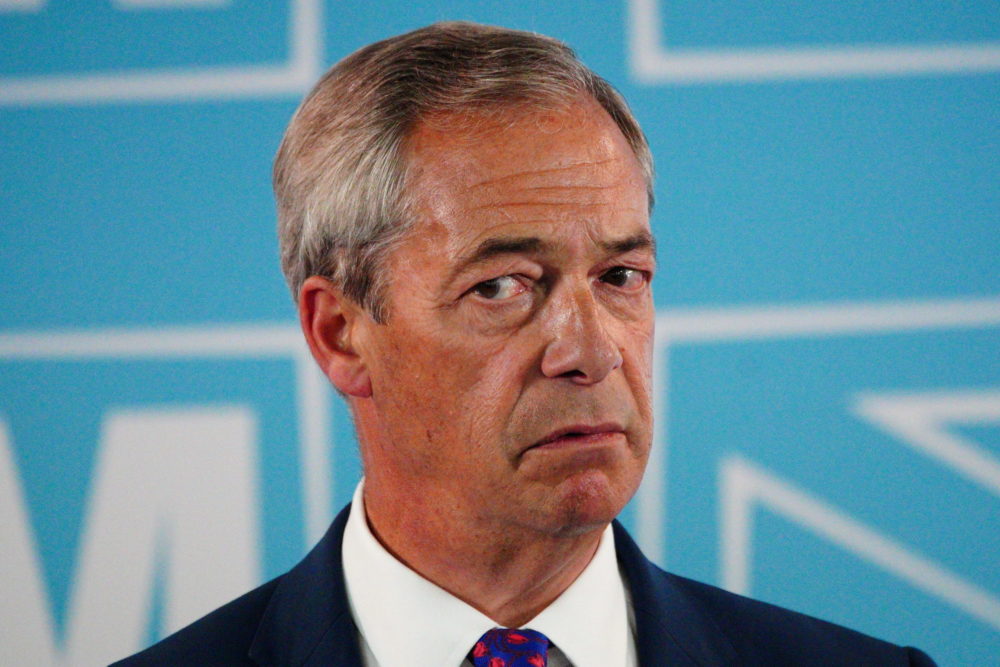Reform has parachuted more general election candidates into Wales than any other party

Nigel Farage’s Reform party has parachuted more general election candidates into Welsh seats than any other party, research by Nation.Cymru has found.
Five of Reform’s general election candidates have an address outside Wales, compared to four candidates from the Conservatives, two from Labour and one each from the Liberal Democrats and the Green party.
Our findings come after Farage came to Wales to launch a Reform manifesto in which the headline pledge is a freeze on “all non-essential immigration.”
Swansea West
Reform’s candidate in Swansea West, Patrick Benham-Crosswell, is the Welsh candidate whose home address is the furthest from the constituency in which they are standing.
With a home address in Dover, Benham-Crosswell faces a drive of around five hours to arrive in south Wales.
The Reform candidate in Dwyfor Meirionnydd also lives more than 200 miles away, although the three others live close to the Welsh border.
Reform was also the party with the second highest number of candidates from outside Wales in the last Senedd election.
Since then the Welsh Government has introduced legislation to ensure all candidates for future Senedd elections will have to live in Wales.
That hasn't stopped Labour selecting two candidates living in London to stand in Welsh seats at the general election, a move which has been controversial with local members.
Torsten Bell, Labour’s candidate in Swansea West whose address is in north London, is among five candidates who live 200 miles or more from the constituency they are contesting.
Cardiff West
Labour have also selected a candidate living in east London to contest Cardiff West, which is the constituency with the highest number of candidates living outside Wales.
The Conservative party’s candidate is also from London, while the Liberal Democrat candidate has a home in Bath.
The only candidate running in Wales who is listed as living in Scotland is the Green party’s candidate for Dwyfor Meinionnydd, Karl Drinkwater.
Support our Nation today
For the price of a cup of coffee a month you can help us create an independent, not-for-profit, national news service for the people of Wales, by the people of Wales.









The ultimate poke in the eye. They’ll all beg on their knees for our votes then, if elected, raise their middle finger to us for 5 years. No interest in their constituents only themselves. As for the Reform outsiders, can we refer to that influx as an ‘invasion’ ?
Anyone know if/how many Reform candidates in Cymru have been dumped by their party for being social media friends with fans of the Third Reich or making pro Third Reich and racist comments online?
Fallschirmjager surely?
Plaid and the SNP should field candidates in a significant proportion of English constituencies (if not most, eventually), starting with those immediately adjacent to the borders. The heart of the offer to the English would be TRUE independence for England (Scotland and Wales also), free from the shackles of Ukainia!
Having candidates from outside their county should be completely banned.
I don’t think I’ll ever figure out why having a different country run a separate countries affairs is thought of as democratic.
Does that include Brussels?
All members of the Brussels region gov are all Belgian, one minister president, and 4 ministers, two French speaking and two Dutch speaking. And three state secrataries one of whom must be Dutch speaking.
If you’re alluding to the EU then Each member state decides it’s own rules regarding residency and representation within it’s jurisdiction for its MEPs. For Cymru before Brexit the rules were decided by the UK parliament. I don’t know if or how many MEPs representing Cymru didn’t live here. Of course whilst a member of the EU the UK was represented at the EU Parliament by MEPs, the number determined largely by the UK’s population. This arrangement was a significant driver of the Leave vote as the exceptionalist mindset of many Brits couldn’t come to terms with not being able… Read more »
And you’re surprised! But be warned! There is another, far more worrying implication. The elections for the Senedd in 2026 will be on the basis of proportional representation. A basic probability analysis based on statistics gleaned from past electoral contests, suggests that in a FPTP election, the winning candidate needs around 25% – 27% of votes cast. In a pr system, that threshold falls to just 12% (some analysis suggests even less) which means that, given Reforms current “popularity,” Nigel and his chums could form a substantial part of the next Senedd. For those who supported pr, this is the… Read more »
In the 2026 Senedd Election if Reform of whatever it’s morphed into gets 12% of the popular vote then it should get roughly 12% of Senedd Members.
FPTP is a system that serves those parties that never want the accountability and responsibility of having or sharing power.
The only saving grace there is that they won’t be able to bring in fellow travellers like Grifter Hamilton from over the border. Wales gave the far right the bums rush in the last Senedd elections, we can live in hope.
Don’t find that to be a nightmare at all.
I can still find nothing about Jack Robson online, all I found was this empty profile on a website that appears to exist to connect politicians with lobbyists: https://policymogul.com/stakeholders/19657/jack-robson
Here’s hoping for a parachute failure.
Multiple failures assured but they will have made lots of noise and pinched votes from other parties. I don’t mind the disruption although at the individual level most of the imported candidates of all parties are not particularly appealing.
So you’d prefer Labour?
Don’t care if any live next to Cymru. They don’t live here, they don’t understand our culture and communities, they can’t represent anyone. This foreign invasion must stop (to use their own rhetoric).
I have never understood the thinking behind First Past The Post. It is inheritantly undemocratic. Millions of voters can be, and often are, unrepresented. Proportional Representation also has its problems but, I would maintain, is more democratic. Roughly, the number of votes will reflect the level of representation. E.g. 10% of the votes 10% of the MPs. Over the years I have had discussions with those who like FPTP, and when I suggest it is not democratic, I do not get any convincing explanation of why they think it is. Reform is proposing some exciting changes in its “Contract”. Voting… Read more »
Why are you lot all against Reform? Are you honestly saying you’d prefer Labour?